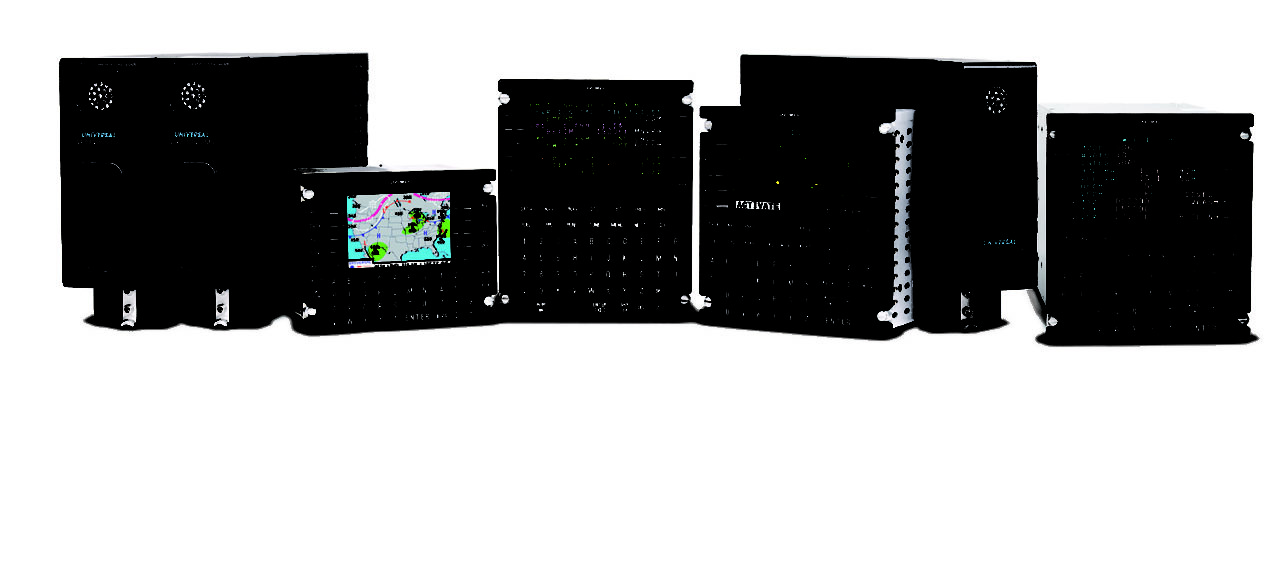[Avionics Today 04-07-2015] Universal Avionics and Rockwell Collins have partnered to bring business aviation operators a new path to Automatic Dependent Surveillance-Broadcast (ADS-B) compliance. Announced a day ahead of the start of the 2015 Aircraft Electronics Association (AEA) International Convention and Trade Show, the two companies combined Rockwell Collins’ TDR-94(D) Mode S Transponder with Universal Avionics’ SBAS-Flight Management System (FMS) to provide a solution that meets the FAA’s 2020 ADS-B Out equipage mandate.
 |
| The components to the combined ADS-B Out solution. Photo: Universal Avionics |
“Universal Avionics has one of the pieces of the solution, the GPS WAAS (required) receiver, but not the transponder. Rockwell Collins has a DO-260B compliant transponder and when the two are combined, the mandate can be complied with,” Carey Miller, avionics business manager of business development at Universal Avionics, told Avionics Magazine.
While the technology was already available for the Universal Avionics SBAS-FMS solution to both companies, by packaging the system together the two hope to offer their customers a more affordable product for compliance. More importantly, the new offering also includes a path toward allowing operators to equip for Controller-Pilot Data Link Communications (CPDLC) and Localizer Performance with Vertical Guidance (LPV) alongside other next generation technologies such as Link 2000+.
“Rather than provide a ‘bolt-on’ solution where the operator will see very little additional benefit, it will be a cost-effective solution that provides a path for new technologies and includes a new Flight Management System (FMS). There are quite a few aircraft out there with FMSs that are 20-plus years old and are becoming more difficult to support,” said Miller.
Equipping for the new solution will require operators to install message annunciators if the Universal Avionics Radio Control Unit (RCU) is not already installed and may, in many cases, require only a few days of aircraft downtime for the upgrade, according to Carey. The solution is primarily being offered to business aviation operators initially, as this is both Universal and Rockwell’s primary customer base and it’s more likely they have the ability to upgrade their FMS in the near future.
“Most of the operators already have Universal Avionics FMSs and Rockwell Collins transponders, so an upgrade to each makes more economic sense and doesn’t require much downtime,” Miller said. He also noted that it’s likely the new solution will be used in air transport operations in the future, but it probably won’t be applicable to the lighter end of the General Aviation (GA) market.
Ultimately, the two companies are hoping the solution will make it easier for operators to equip for NextGen. In turn, they are anticipating that an easier and affordable solution will encourage operators to equip sooner rather than later for the upcoming mandates in both the United States, for NextGen, and in Europe, for the Single European Sky ATM Research (SESAR) initiative, which has also recently moved its mandate to 2020. This doubling down on the 2020 mandate from both the U.S. and Europe could offer some issues, however.
“We are hearing from our authorized dealers that operators are asking about solutions for their aircraft more than before, but they will need to pick up the pace,” said Miller, referring to the ADS-B Out 2020 equipage mandate. “I’m afraid that since Europe moved their ADS-B mandate to 2020, which is the same as the U.S., production and installation capacity might not be able to keep up. The result will be higher equipment and installation pricing as the mandate nears.”
As operators everywhere begin to think seriously about equipage, the two companies believe that by joining forces they can bring their new solution to the market in a faster and cheaper way than ever before, allowing operators to equip before the scramble begins.
“Installation and equipment pricing won’t be cheaper than it is now,” said Miller. “I’d suggest operators upgrade their aircraft sooner rather than later.”